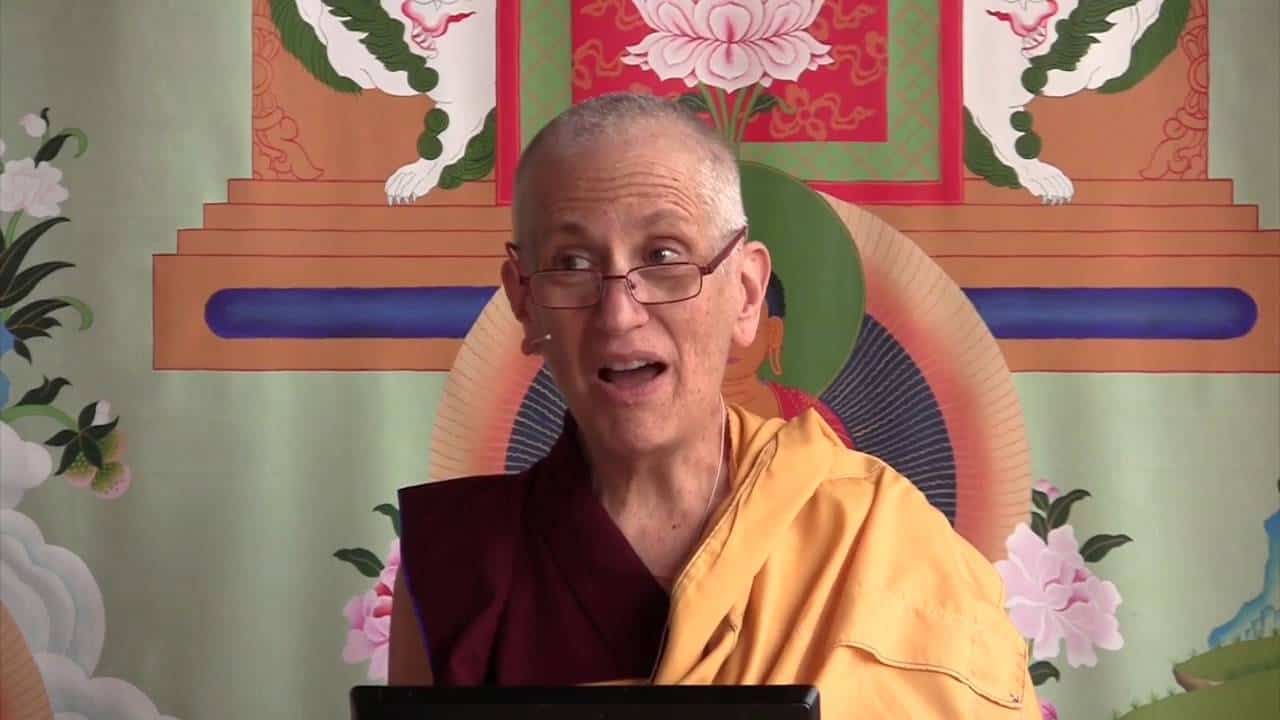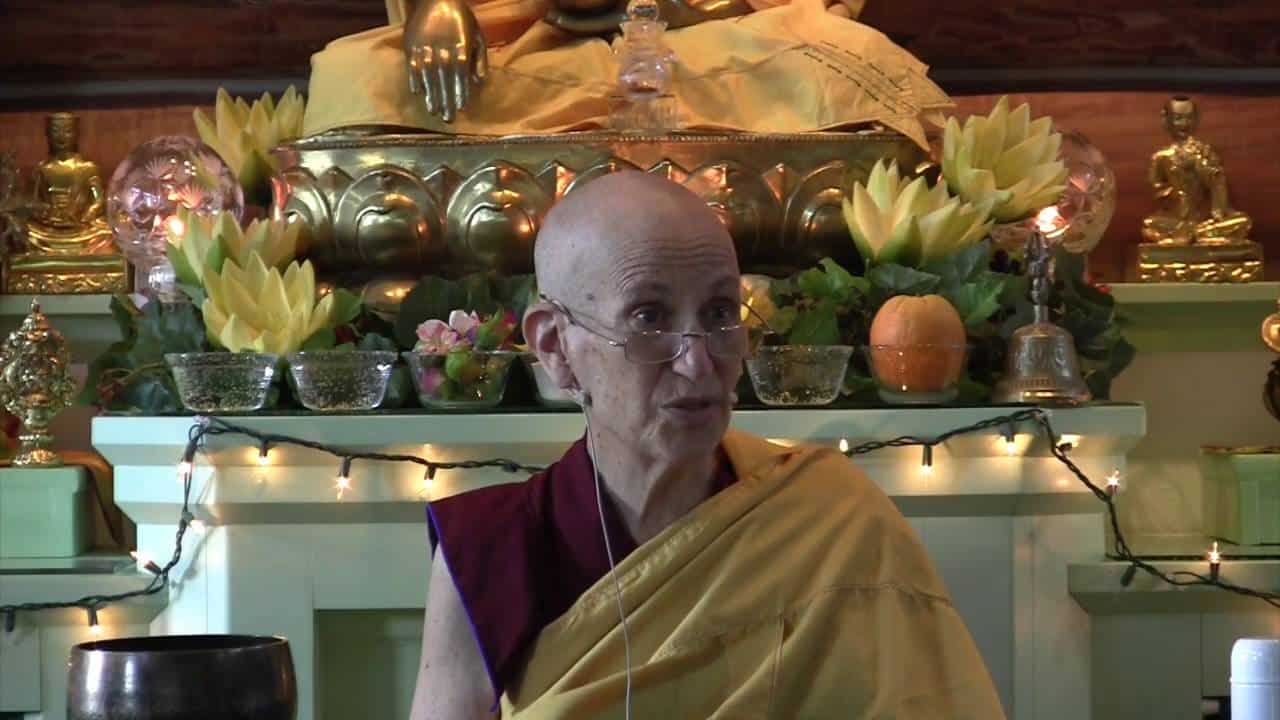Reflecting on the six types of dukkha
The text turns to training the mind on the stages of the path shared with intermediate level practitioners. Part of a series of teachings on the Gomchen Lamrim by Gomchen Ngawang Drakpa. Visit Gomchen Lamrim Study Guide for a full list of contemplation points for the series.
- The six faults of cyclic existence in general
- Uncertainty
- Dissatisfaction
- Abandoning your body repeatedly
- Taking birth repeatedly
- Repeatedly changing status
- We die alone
- The six types of dukkha can be condensed into three
- Contemplating the specific types of dukkha of the beings in each realm
Gomchen Lamrim 45: The six types of dukkha (download)
Contemplation points
- Contemplate the dukkha of uncertainty. Make examples from your life:
- We make all sorts of plans in our life, but we can’t control what happens.
- The more we cling to permanence, trying to make the world the way we want it to be, the more unhappy we are.
- Intellectually, we understand uncertainty, but when we get up each morning, there we are with our plans and again we are disappointed.
- We do this again and again, day after day, year after year, life after life.
- Contemplate the dukkha of dissatisfaction. Make examples from your life:
- Consider that in infinite previous lives, we’ve been born as every kind of being and done everything, yet we haven’t gained any satisfaction in all that time.
- We never seem to have enough money, financial security, love, appreciation… We never seem to be enough, to do enough… Whatever we have, whatever we do, whoever we are is never enough.
- As a result, we run around all day looking for more and better and yet we are still never satisfied.
- In the process of this pursuit we make ourselves quite miserable.
- We do this again and again, day after day, year after year, life after life.
- Contemplate the dukkha of abandoning the body repeatedly. Make examples from your life:
- Death is not something we look forward to. It means separation from what is familiar, from the people we care about, from our very ego identity (who we think we are).
- As long as we’re in samsara, this separation is a given; we cannot avoid it.
- We do this again and again, losing our loved ones, our possessions, our identity, life after life.
- Contemplate the dukkha of taking a new body repeatedly. Make examples from your life:
- Because we haven’t realized the nature of reality, misapprehend how things exist, are full of wrong views, etc, death doesn’t bring an end to our suffering. We are just reborn again.
- If you attain a human rebirth, you start out as a baby where you can’t control anything and you can’t communicate. You are helpless and at the whim of others. You go through school all over again, adolescence, relationships not working out, working for a living, losing the people you love…
- Imagine being born as a hell being, a preta, an animal… What would it be like to be born with limited mental faculties, so much pain or craving or confusion that you don’t even know to act virtuously; there is no thought of anything bigger than the next meal or escaping pain…
- We do this again and again, life after life after life.
- Contemplate the dukkha of repeatedly changing status. Make examples from your life:
- We can have wealth and power in one life and then be reborn destitute, unable to secure even our basic needs in the next life.
- Because our rebirth is dependent on the karma we create and what ripens at the time of death, we are never quite sure where we will be reborn or what conditions we’ll encounter.
- Think of people in your life or in the news… Think of people with great power, money, and influence. How are they using it? Are they creating the causes for happiness or suffering? To what realm will their actions take them?
- Even in this life, our status goes up and down. Think of specific examples from your own life.
- There is no security and yet that’s what we work for day and night. Do we ever feel totally secure?
- We do this again and again, life after life after life.
- Contemplate the dukkha of dying alone. Make examples from your life:
- You can have as many people as you want surrounding you when you die. You can have an incredible obituary and your funeral can be televised, but when you die, you die alone.
- We spend our lives in pursuit of things and relationships from morning to night, tinkering with all the details of mundane daily life trying to eke out the most pleasure… while the only thing that makes things better for us is the state of our own mind. Do we even pay attention to this most of the time?
- We do this again and again, life after life after life…
- Consider that to lessen our anguish, we have to release our attachment, anger, resentment, and so on…
- Seeing the defects of samsara, feel a sense of disenchantment with it and a desire to be free of these forms of dukkha entirely. Determine to practice the path that leads to liberation.
- Consider that all other sentient beings are experiencing the same forms of dukkha. No matter who they are or what they look like, they experience these. Think of specific people (those you like and those you don’t). Allow compassion to arise and determine to practice the path for their sakes as well.
Venerable Thubten Chodron
Venerable Chodron emphasizes the practical application of Buddha’s teachings in our daily lives and is especially skilled at explaining them in ways easily understood and practiced by Westerners. She is well known for her warm, humorous, and lucid teachings. She was ordained as a Buddhist nun in 1977 by Kyabje Ling Rinpoche in Dharamsala, India, and in 1986 she received bhikshuni (full) ordination in Taiwan. Read her full bio.


